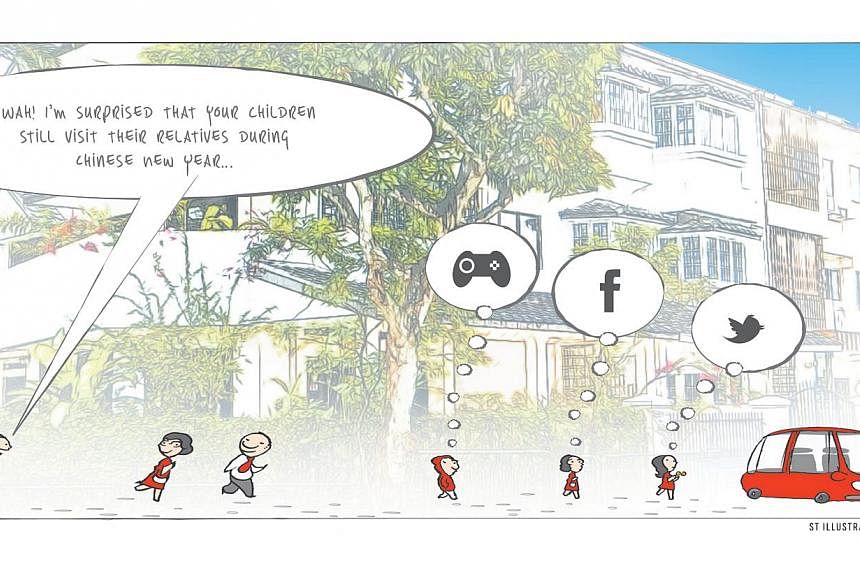Ms Jennifer Foo, 20, is unsure if a reunion dinner with her immediate family members is on the cards on Wednesday, the eve of Chinese New Year.
"If it happens, it happens. It didn't happen last year," she says nonchalantly.
The lack of usual must-do reunion dinner plans aside, she adds that there are also no festive goodies in her home.
Neither is her house decorated to welcome spring.
Oh, and she last saw her paternal grandmother 13 years ago, when she was seven years old.
"I'm pretty sure she's still alive, but I'm not sure if my father visits her. He doesn't really talk about his family," says Ms Foo, who is taking a gap year before university.
She is not alone in her sentiments.
SundayLife! found several individuals for whom Chinese New Year does not entail visiting relatives, reunion dinners or other festivities, and whose actions seem to go against the spirit of the season.
The custom of reunion dinners came about because in the days before modern and affordable forms of transportation, it was difficult for family members living in various parts of China to return to their hometown more than once a year.
Chinese New Year was the only time when they would make the journey home for a reunion.
Visits are an extension of the reunion dinners, for people to exchange greetings and catch up with their friends and relatives after making the journey home.
In Singapore, many families also decorate their homes and buy snacks and goodies in preparation for such visits.
Not housewife Catherine Lim, though.
Says the 56-year old: "I don't like having Chinese New Year flowers and plants in my house. It makes the place messy."
She does not buy any goodies either because she does not have any visitors during the festive period.
Visiting for her and her taxi driver husband, 61, ceased after 2012 following the death of her mother- in-law.
"After she died, I had no desire to celebrate CNY," she says.
Her own mother died a year later, which made her even less in the mood for the season's festivities.
The couple have a son, 29, a social entrepreneur, but he often takes off for business trips during Chinese New Year.
As such, they usually spend the holidays going out as a couple, watching movies or just staying at home.
Another reason Mrs Lim does not go visiting is because she wants to avoid contact with her siblings. She does not like them asking her when her son is going to settle down.
"I get asked the same questions every year. It's annoying and I don't want to deal with it. I'm fine with spending Chinese New Year with just my husband," she says.
Assistant professor Helena Gao from Nanyang Technological University's division of Chinese in the School of Humanities and Social Sciences says that when parents die, Chinese traditions may gradually fade.
"Older generations play an important role in keeping traditions and families together," she says.
Deaths in the family do not affect the attitudes of only older family members towards Chinese New Year.
Young adults are affected too.
Operations manager Jackson Lim, 29, has not celebrated Chinese New Year since his father died when he was 15 years old in a tragic hit-and-run accident.
His dad, a construction site manager, was 39 when the accident happened just after Chinese New Year.
"I stopped celebrating after that," says Mr Lim. "I stopped buying new clothes for myself for Chinese New Year and I don't have a reunion dinner with my immediate family members either."
He is the eldest of four siblings and his mother, 56, is a housewife.
Mr Lim says he has been using the annual festive season to holiday overseas. So far, he has gone to a host of South-east Asian and European countries and cities, including London and Paris, usually travelling solo.
"My mum doesn't mind me taking off during the new year," he says. "My grandparents mind but I don't care. It's very bad, I know."
He has many fond memories of celebrating Chinese New Year as a child, though.
He remembers going shopping for new clothes with his siblings and visiting the night markets that took place when the public holiday drew near.
He also remembers his parents plastering red packets all over their home. Some of these would have money inside and he and his siblings would take turns to guess which these were.
"That game was really fun. But after my father died, the traditions died too. Perhaps my father held it all together - something I don't want to do," he says.
Indeed, some of those interviewed by SundayLife! recognise that their present-day family ties are a far cry from yesteryear, but either do not know how to approach the subject with their parents or cannot bring themselves to.
In Ms Foo's case, she is close to relatives from her maternal side, but is unsure of how many siblings her father has, much less the number of paternal cousins.
Because her father does not talk about his family members, she gets the sense that it is a topic he is "sensitive" about.
"I don't really dare to ask him about it," she says.
The Chinese New Year period to her is about staying at home. "I read, I relax, I do nothing. It's uneventful," she says.
"I don't find that I'm lacking something. It's totally fine. I don't like celebrating things to begin with. It's a lot of fuss."
Undergraduate Cheryl Lee, 23, also has a quiet Chinese New Year.
After accompanying her parents to her grandparents' homes, she usually leaves to go home.
"I think it's important to pay my respects to my grandparents, but I'm not that close to my cousins, so I just go home after I've seen my grandparents, while my parents stay behind to play mahjong or chat with the other relatives," says Ms Lee, a communications student at Nanyang Technological University.
She does not do any other visiting.
"Some people visit for the sake of visiting. I'm glad my family doesn't make me feel there's that obligation," she says.
Assistant professor Gao says that the fast pace of life here and the attractions of the world beyond families make people feel less of a need to have events together with their family members.
"It is not surprising that this could happen. This is not a sad nonchalance found only in Singapore," she says.
"This gradual change of old traditions is something that is happening in all metropolitan cities. People are focusing more on their own priorities, be they in their 20s, 30s, 40s, or 50s."
Others, however, are determined to keep traditions going, despite the fact that their parents do not insist they observe them.
Like for Ms Lee and Ms Foo, nothing much happens during Chinese New Year for undergraduate John Teh, 24, and his family members. He is studying commerce at the University of Queensland in Australia.
He says his elder brother and only sibling, 28, stays at home to play computer games, while his parents visit their friends.
"My mum and dad have issues with their family members and they have kept us away from their family members since we were young," he says.
"It's complicated."
It has been years since he has seen his extended family members although two years ago during Chinese New Year, he saw some of his cousins and relatives on a rare occasion.
He recalls at that meeting that he felt a tug at his heart to get to know his cousins.
"But they seemed distant and I felt it was too late. We're all growing up and going our own ways," he says.
He has accepted that Chinese New Year comes with neither visits nor decorations at home, but tries to buy new clothes for the festive period just to keep the festive spirit going.
He also visits his friends and organises gatherings at his own home for his friends during that period.
He looks forward to things changing when he and his brother get married and have their own children.
"I would want our children to know one another," he says.
"People always say that family comes first. But I realise that I need to know my family members before I can put them first."
Do you think it is a must to have reunion dinners and family visits during Chinese New Year? Send your comments to stlife@sph.com.sg


